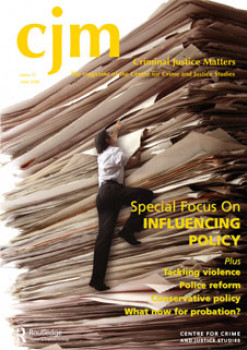This issue includes a themed section, edited by Betsy Stanko, examining the criminal justice policy making process.
Contributors include Jan Berry reflecting on her chairmanship of the Police Federation; Michele Burnam reporting on the work between criminologists and the Scottish Executive and Peter Dunn on government policy towards victims and witnesses.
The magazine also includes a variety of articles on topical issues that comment on the government's recent violent crime action plan, the Flanagan Review of policing, probation reform and the Conservative's criminal justice policies.
In this edition
Enver Solomon and Rebecca Roberts introduce this issue of cjm
By Enver Solomon and Rebecca Roberts
Simon Hallsworth critiques the government’s latest approach to tackling violent street crime
By Simon Hallsworth
Alan Travis reflects on the Conservative’s approach to crime and justice
By Alan Travis
Barry Loveday takes a critical look at the ‘cautious’ recommendations of the most recent review of policing
By Barry Loveday
Lol Burke and Steve Collett consider the key policy drivers which have shaped probation and what the future holds following the restructuring of the Ministry of Justice
By Lol Burke and Steve Collett
Betsy Stanko laces the contributions of this section together and encourages us to continue to take the opportunity to influence policy and practice
By Betsy Stanko
Martin O’Brien considers whether criminal justice policy is too important to be left to criminologists
By Martin O’Brien
By Ian Loader and Richard Sparks
Mick Ryan says the penal reform lobby is no longer the dominant force it once was and that it must adapt to a changing policy environment
By Mick Ryan
Roger Grimshaw and Enver Solomon explain their research on ‘knife crime’ in the context of increasing political attention on the issue.
By Roger Grimshaw and Enver Solomon
By Zoë Davies and Louise Hazell
